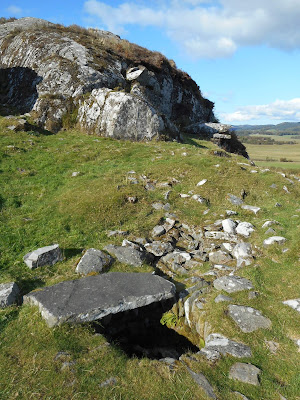Over the weekend I managed to make a visit at long last to Dunadd (Dùn Ad), the ancient Iron Age hill fort near Kilmartin in Argyll which was once the capital of the historic kingdom of Dalriada (Dál Riata). This long forgotten kingdom by many once straddled the Irish Sea and encompassed County Antrim in the north of Ireland, and Argyll and Lochaber in the west of Scotland. It was the Gaelic clans of this region who were said to have given Scotland its name - the word 'Scot' coming from Scoti, the Latin name used by the Romans to denote the Gaelic inhabitants of Ireland.
Traditionally it is said that the Irish settlers colonised the west of Scotland via three sons of Erc - Fergus Mór, Loarn and Óengus. Fergus Mór is one I am certainly well familiar with, as it was he who died off the coast of Antrim whilst trying to reach a well on a rock said to cure leprosy. That rock became known as Carraig Fheargais - Carrickfergus - my home town in Antrim. The three sons of Erc were said to have brought Christianity and Gaelic with them, but this traditional view is one that is currently being challenged by some archaeologists who believe that there is no evidence of an invasion as such, but rather a people long resident on both sides who were linked by the Irish Sea rather than divided by it. For more on the importance of Dalriada and Dunadd visit https://en.wikipedia.org/wiki/D%C3%A1l_Riata.
The images below show the various sites on the hill fort, which can be climbed, including the ancient well, some of the defensive ramparts, and the stone on which the coronation of the ancient Scottish kings occurred, including the small footprint basin into which the rulers placed their foot during the ceremony. If you fancy a visit, see www.historic-scotland.gov.uk/propertyresults/propertydetail.htm?PropID=PL_174 for further details.















No comments:
Post a Comment